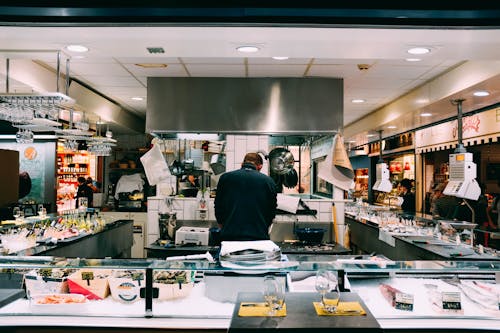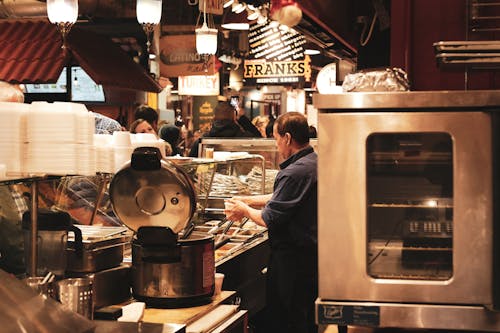
Introduction
The life of a restaurant chef is often portrayed as glamorous, with celebrity chefs gracing television screens and publishing best-selling cookbooks. However, behind the scenes, the reality is far more complex and demanding. This article delves into the multifaceted lifestyle of chefs, exploring their daily routines, the pressures and rewards of the profession, the skills and dedication required, and the impact on their personal lives.
The Daily Routine of a Chef
Early Mornings and Preparation
For many chefs, the day begins early, often before sunrise. The first task is to inspect the kitchen, ensuring that all equipment is in working order and the kitchen is clean and ready for the day. Chefs then review their inventory, checking the quality and quantity of ingredients. Freshness is paramount, so this task is crucial to maintaining high standards.
Next, chefs often visit local markets or receive deliveries from suppliers. This is a critical part of their routine as it allows them to select the best ingredients, which are the foundation of any great dish. The morning is also spent prepping ingredients—chopping vegetables, marinating meats, and preparing stocks and sauces. This mise en place (everything in its place) is essential for the smooth operation of the kitchen during service.
Midday and Afternoon
As lunchtime approaches, the kitchen springs into action. Each member of the team has specific responsibilities, from the sous chef who oversees operations to the line cooks who prepare the food. The head chef orchestrates this culinary symphony, ensuring that every dish meets the restaurant’s standards.
After the lunch rush, there’s usually a brief respite. Chefs use this time to plan the evening service, refine dishes, and experiment with new recipes. They may also hold briefings with their team to address any issues from the lunch service and prepare for dinner.
Evening Service
Dinner service is often the busiest and most demanding part of a chef’s day. The pressure is intense as chefs strive to deliver perfect dishes promptly. Coordination and communication are critical. Any mistake can lead to delays, dissatisfied customers, and wasted ingredients.
As the evening winds down, the focus shifts to cleaning and maintenance. Chefs ensure that all stations are cleaned, equipment is properly stored, and food is correctly labeled and refrigerated. This routine not only maintains hygiene standards but also sets the stage for the next day.
The Pressures and Rewards of the Profession
High-Stress Environment
The kitchen is a high-stress environment. Chefs must manage multiple orders simultaneously, handle unexpected challenges, and maintain composure under pressure. The fast-paced nature of the job requires quick decision-making and constant vigilance. The pressure to consistently deliver high-quality food can lead to long hours and physical exhaustion.
Creativity and Innovation
Despite the pressures, being a chef is also a highly creative profession. Chefs have the opportunity to innovate, experimenting with new flavors, techniques, and presentations. This creative aspect is one of the most rewarding parts of the job, allowing chefs to express their culinary artistry and push the boundaries of traditional cuisine.
Customer Satisfaction
For many chefs, the ultimate reward is customer satisfaction. Positive feedback, whether through direct compliments or positive reviews, provides a sense of accomplishment and validates their hard work. Chefs take pride in knowing that their creations bring joy to others.
Skills and Dedication Required
Culinary Skills
To excel as a chef, one must possess exceptional culinary skills. This includes a deep understanding of cooking techniques, flavor profiles, and ingredient properties. Chefs must be proficient in a wide range of skills, from butchery and pastry making to sauce preparation and plating.
Leadership and Team Management
A successful kitchen operates like a well-oiled machine, and chefs must be effective leaders and managers. They need to delegate tasks, motivate their team, and resolve conflicts. Strong leadership skills ensure that the kitchen runs smoothly and efficiently.
Continuous Learning
The culinary world is constantly evolving, with new trends, techniques, and ingredients emerging regularly. Chefs must be committed to continuous learning, staying updated with industry developments, and refining their skills. This dedication to growth is essential for maintaining a competitive edge.
Physical and Mental Stamina
The demanding nature of the job requires both physical and mental stamina. Chefs spend long hours on their feet, often in hot and cramped conditions. The ability to remain focused and composed despite fatigue is crucial. Mental resilience is equally important, enabling chefs to handle stress and pressure effectively.
Impact on Personal Life
Work-Life Balance
One of the significant challenges chefs face is maintaining a work-life balance. The long hours and demanding nature of the job often leave little time for personal life. Chefs may miss out on family events, social gatherings, and leisure activities. This can lead to feelings of isolation and strain on personal relationships.
Health and Well-being
The physical demands of the job can take a toll on chefs’ health. Prolonged standing, repetitive motions, and exposure to heat can lead to various health issues, including back pain, joint problems, and dehydration. Additionally, the high-stress environment can contribute to mental health challenges, such as anxiety and burnout. Chefs must prioritize self-care and seek support when needed to maintain their well-being.
Passion and Fulfillment
Despite these challenges, many chefs find immense fulfillment in their work. The passion for food, the joy of creating, and the satisfaction of pleasing customers drive them to persevere. For many, being a chef is not just a job but a calling, and the rewards far outweigh the sacrifices.
The Role of Technology and Modern Trends
Technological Advancements
Technology has significantly impacted the culinary world. Modern kitchens are equipped with advanced tools and appliances that enhance efficiency and precision. From sous-vide machines and induction cooktops to digital thermometers and food processors, these innovations allow chefs to achieve consistent results and explore new culinary techniques.
Social Media and Branding
Social media has revolutionized how chefs connect with their audience. Platforms like Instagram, Facebook, and YouTube allow chefs to showcase their creations, share recipes, and engage with food enthusiasts worldwide. Building a personal brand through social media can lead to new opportunities, such as collaborations, endorsements, and media appearances.
Emphasis on Sustainability
There is a growing emphasis on sustainability in the culinary world. Chefs are increasingly adopting practices that promote environmental responsibility, such as sourcing local and organic ingredients, reducing food waste, and using eco-friendly packaging. This trend reflects a broader movement towards conscious consumption and ethical dining.
Training and Career Development
Culinary Education
Formal culinary education provides aspiring chefs with foundational skills and knowledge. Culinary schools offer comprehensive programs that cover various aspects of cooking, from basic techniques to advanced culinary arts. Students learn about food safety, nutrition, menu planning, and kitchen management.
Apprenticeships and Mentorship
Hands-on experience is invaluable in the culinary profession. Many chefs begin their careers through apprenticeships, working under experienced chefs to hone their skills. Mentorship plays a crucial role in professional development, providing guidance, support, and opportunities for growth.
Career Progression
The path to becoming a head chef often involves progressing through various roles, such as line cook, sous chef, and executive chef. Each position comes with its own responsibilities and learning opportunities. Ambitious chefs may also explore opportunities beyond the kitchen, such as food writing, consulting, or opening their own restaurant.

Conclusion
The lifestyle of restaurant chefs is characterized by hard work, dedication, and a deep passion for food. While the profession comes with significant challenges, including long hours, physical demands, and high stress, it also offers immense rewards, such as creative fulfillment, customer satisfaction, and opportunities for innovation. The evolving culinary landscape, influenced by technology, sustainability, and modern trends, continues to shape the profession. For those who embrace the demands and rewards of the culinary world, being a chef is more than just a career—it is a lifelong journey of learning, creativity, and passion.














